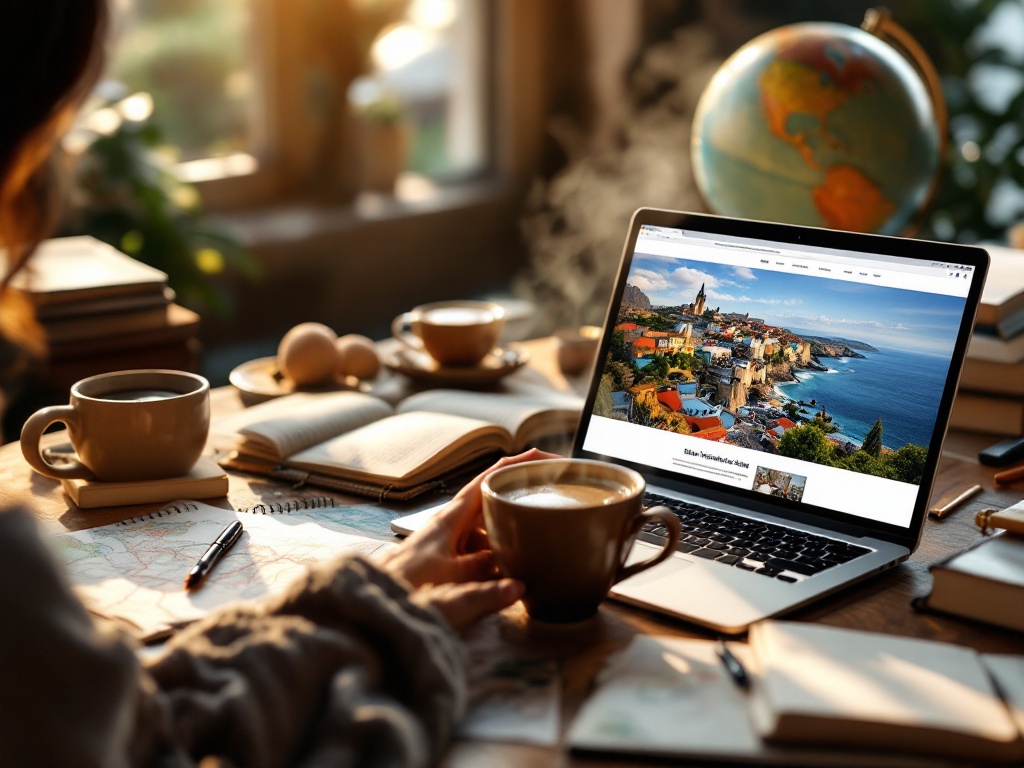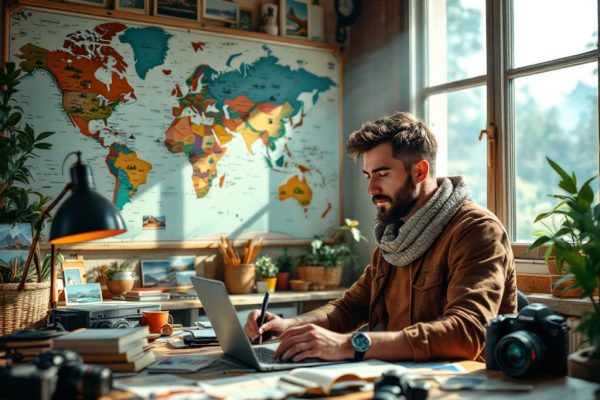How to Do Research in Travel Writing: Best Methods
Want to write captivating travel articles that transport readers? Discover the secrets to crafting compelling narratives through effective research. Learn how to blend online resources, firsthand experiences, and local interactions to create authentic and engaging travel pieces. Explore practical tips for planning research trips, organizing your findings, and ensuring accuracy. Dive in and transform your travel writing from ordinary to extraordinary.
Important information

- Thorough research, including online resources, firsthand experiences, and local interactions, is crucial for creating authentic and engaging travel writing.
- Immersing yourself in the destination’s culture through observation, interviews, and participation in local activities provides valuable insights and unique perspectives.
- Fact-checking and cross-referencing information from reliable sources ensures accuracy and credibility, building reader trust.
- Detailed note-taking, organizing research materials, and utilizing tools like audio recorders help capture and manage information effectively.
- Planning a research trip involves defining objectives, identifying resources, creating a flexible itinerary, and contacting relevant institutions in advance.
Introduction to Research in Travel Writing
Research is crucial for compelling travel writing, adding authenticity and depth that engage readers. Immersing yourself in the destination yields richer narratives. Effective research involves exploring online resources, firsthand experiences, and engaging with locals. Immersing yourself provides invaluable cultural insights, while online resources offer current information. Talking to locals offers unique perspectives.
Enhance Your Travel Writing
Travel literature can inspire your writing style. A combination of online and offline research is often most effective.
- Explore travel blogs and forums for insights from fellow travelers.
- Use social media to discover local experiences.
- Consult guidebooks for practical and cultural information.
Ensure Accuracy and Authenticity
Cross-referencing resources ensures accuracy. Directly contacting locals adds firsthand accounts, creating a well-rounded and engaging narrative.
Importance of Research in Travel Writing
Thorough research is essential for captivating travel writing, ensuring accuracy and demonstrating cultural sensitivity. Blending research with personal experiences adds authenticity and depth that resonate with readers. This firsthand knowledge creates compelling and believable narratives.
Immersion
Immersing oneself in a destination allows writers to capture its true essence. By observing cultural nuances, writers enrich their narratives with vivid details. Interviewing locals provides invaluable insights, adding depth and authenticity to travel pieces.
Personal Touch
Personal observations enhance engagement and draw readers into the writer’s journey. They provide a unique perspective, making the narrative more relatable and captivating.
Preparing for a Successful Research Trip
Planning a successful research trip involves several key steps. First, create a detailed itinerary outlining your research goals and objectives. Next, contact research institutions and individuals you plan to visit to arrange meetings and collaborations. Then, book your flights and accommodation in advance to secure the best deals and avoid last-minute complications. Finally, thorough preparation will not only maximize your research outcomes but also minimize potential problems, ensuring a productive and insightful experience.
Planning Your Itinerary Thoughtfully
A well-planned itinerary is crucial for a successful research trip, but avoid over-scheduling. Allow ample time for exploration and information gathering. This thoughtful approach offers significant advantages, enabling full immersion in the research environment and ensuring thorough investigation. Consider these essential steps when planning your research trip:
Define your research objectives. Clearly stating your goals will guide your itinerary and ensure efficient use of your time.
Identify key resources and locations. Determine essential archives, libraries, or field sites relevant to your research.
Allocate sufficient time for each site. Factor in travel time, potential delays, and the depth of research required at each location.
Build in flexibility. Unexpected discoveries or challenges may arise, so incorporate buffer time to adapt your schedule.
Plan for downtime. Research trips can be intensive, so schedule breaks for rest and reflection to avoid burnout.
Contacting Key Research Institutions in Advance
Connecting with research institutions before traveling can significantly enhance your research. Early communication allows them to gather relevant resources and potentially connect you with experts in your field. This preparation ensures a more productive and insightful visit for your writing. Reach out to institutions in advance to maximize your research trip.
Effective Research Methods for Travel Writers
Research your destination online using search engines, travel guides, and tourism websites. Gain local perspectives from blogs, forums, and social media groups. Explore travel literature, such as novels, memoirs, and travelogues, for cultural insights.
Increase Publication Chances
Research target publications to understand their readership and preferred style. Analyze previously published articles for topic ideas and writing approaches. Tailor your writing to the publication’s specific needs for better chances of acceptance.
On-Location Research
Immerse yourself in the local culture by visiting markets, attending events, and interacting with residents. Document your experiences with detailed notes, photographs, and videos. Use these firsthand experiences to create authentic and engaging narratives.
Preliminary Research: Laying the Groundwork
Thorough preparation is key to a successful research trip. Understanding your destination’s history and culture helps you identify fascinating locations and formulate insightful questions in advance, perhaps about local customs or past events. While pre-trip research is invaluable, remain open to unexpected discoveries. Connecting with local experts beforehand can enrich your writing, adding depth and perspective to your travel narratives. Solid groundwork transforms a simple trip into a productive research expedition.
Understand your destination. Research the history and culture of your destination to identify fascinating locations and formulate insightful questions.
Plan, but stay flexible. Pre-trip research is essential, but be open to unexpected discoveries.
Connect with local experts. Contacting local experts before your trip can provide valuable insights and perspectives.
Researching Destinations: Boosting Publication Success
Thorough research is essential for getting your travel writing published. Editors value credibility, and strong research bolsters your pitches. Guidebooks, websites, and interviews with locals are valuable resources for gaining insights. However, nothing surpasses firsthand experience. Immersing yourself in the local culture helps you capture unique details. Organize your research using outlines and categorize your notes by location, using digital or physical folders for easy access while writing.
Conduct thorough research using guidebooks, websites, and interviews with locals.
Experience the destination firsthand to gather unique details.
Organize your findings with outlines and categorize notes by location.
On-Location Research: Capturing Cultural Insights
On-location research immerses you in a destination’s culture, connecting you with local communities and their traditions. Experiencing the environment and observing daily life firsthand, such as dining at historic restaurants, adds authenticity to your travel writing. This direct interaction provides valuable insights, making your narrative more credible, engaging, and nuanced.
Tools and Techniques for Organizing Travel Research
Organization
For travel writers, organization is essential. Categorizing information by topic or location streamlines research, while consistent file naming simplifies finding details. Protecting your work with cloud storage and backups is crucial.
Note-Taking
Thorough note-taking is vital. Document everything: observations, conversations, even your feelings. A consistent format with dates, times, and locations will prove invaluable. Regular transcription keeps everything manageable.
Audio Recordings
Audio recordings are a powerful tool, supplementing your written notes with sounds and interviews. Clear labeling with dates, times, and topics, followed by transcription, allows seamless integration with your other notes.
Organization: Key Strategies for Travel Writers
Create outlines by theme or topic to maintain writing focus.
Categorize notes by location or experience for increased clarity.
Maintain separate folders (digital or physical) for each trip to simplify information management.
Use tools like spreadsheets, note-taking apps, and travel journals to track information, quotes, and ideas.
Note-Keeping: Documenting Your Experiences
Note-keeping is crucial for capturing authentic experiences, adding rich details that elevate your storytelling. Detailed notes not only make narratives more compelling but also boost memory recall. They’re invaluable for travel writing, breathing life into descriptions with specific sensory details. Even quick observations prove useful, adding depth and nuance. Ultimately, note-keeping empowers any story.
Audio Backup: Using a Voice Recorder Effectively
Capture fleeting thoughts and observations with a voice recorder. It’s a handy tool that ensures important details aren’t lost, supplementing traditional note-taking by allowing ideas to flow freely. Record descriptions of your travels, conversations with interesting people, or even spontaneous bursts of inspiration. This audio record is invaluable, providing a transcript-ready backup or a simple memory jogger when you finally sit down to write. Here are some ways a voice recorder can be useful:
- Travel journaling, capturing vivid descriptions of places and experiences.
- Recording interviews or important conversations.
- Documenting spontaneous ideas or creative inspiration.
Fact-Checking and Providing Credible Information
Fact-checking is crucial for travel writing, ensuring accuracy in essential details like dates, locations, and cultural nuances. This precision builds reader trust and safeguards a publication’s reputation. Errors can severely damage credibility. Cross-referencing multiple sources is essential for accuracy and strengthens an article’s reliability. For instance, verifying opening hours with official websites prevents misinformation. Although fact-checking requires time, it’s invaluable for upholding high journalistic standards.
Fact-Checking: Ensuring Accuracy in Travel Articles
Fact-checking is crucial for travel writing, safeguarding the author’s and publication’s reputation. Thorough verification, using multiple reliable sources, guarantees accuracy. These sources can include official tourism websites, local news outlets, and interviews with local experts. Accurate information prevents misinformation and builds reader trust. Furthermore, fact-checking involves verifying details like dates, locations, names, and cultural nuances, enhancing the article’s credibility and value.
Impact of Travel Research on Writing
Thorough travel research is crucial for understanding diverse cultures, enabling writers to portray destinations with sensitivity and nuance. This research provides valuable context, enriching stories with authentic details of local customs and traditions and moving beyond superficial observations. Immersing readers in these authentic details, along with understanding local etiquette, prevents misinterpretations and fosters a deeper appreciation for the destination. Exploring the history of landmarks and rituals adds depth and meaning to the narrative, leading to richer travel writing that resonates with readers. Ultimately, thorough research bridges the gap between the writer’s experience and the reader’s understanding, bringing the story to life.
Benefits of Travel Research for Writers
- Understanding diverse cultures, allowing for sensitive and nuanced portrayals of destinations.
- Providing valuable context, enriching stories with local customs and traditions.
- Moving beyond superficial observations to immerse readers in authentic details.
- Preventing misinterpretations by understanding local etiquette.
- Adding depth to narratives by exploring the history of landmarks and rituals.
Impact on Travel Writing
- Creates richer, more resonant stories.
- Bridges the gap between the writer’s experience and the reader’s understanding.
- Brings the story to life by providing authentic and meaningful details.
- Fosters a deeper appreciation for the destination in readers.
- Enhances the credibility and authority of the writer.
Cultural Familiarity: Adding Depth to Your Stories
Cultural familiarity greatly enriches travel writing. It provides authentic glimpses into local customs and traditions. Through firsthand experiences, writers capture a place’s unique character, fostering empathy and respect. This results in more nuanced and engaging narratives.
Immersive Experiences
Immersive experiences allow travel writers to move beyond superficial observations. They delve into the heart of a culture, imbuing their writing with genuine emotion. Understanding local etiquette prevents misunderstandings and fosters meaningful interactions, leading to richer stories that resonate with readers.
Insightful Storytelling
Cultural knowledge transforms travel writing from simple observation into insightful storytelling. While it demands dedication and a willingness to learn, the rewards are immeasurable.














